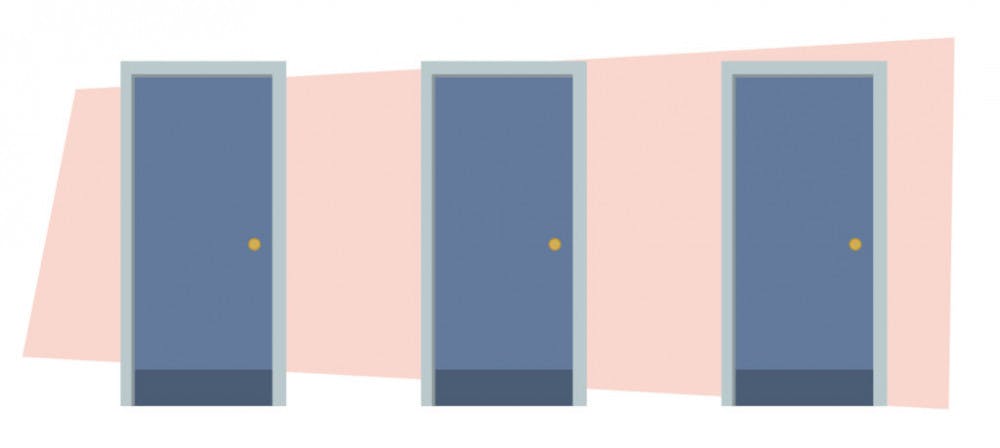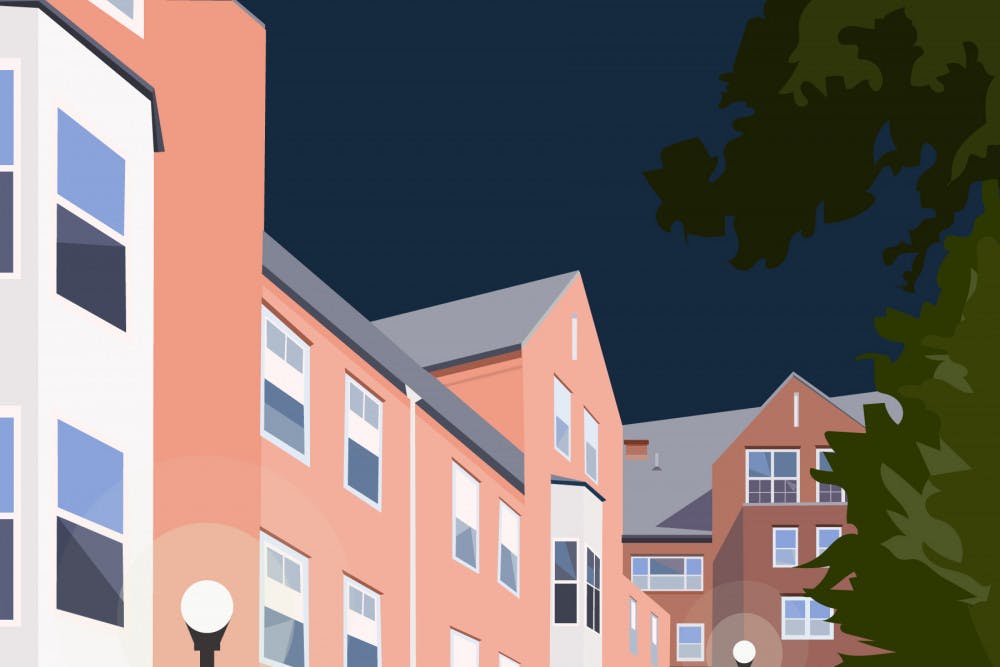College students across the country are preparing for an academic year like no other: masks in near-empty lecture halls, regular nasal swab testing and no large campus gatherings.
For the limited number of students who will be permitted to return to campus in late August, healthy and safe dorm conditions are thought to be non-negotiable. But some students living in Vartan Gregorian Quadrangle (New Dorm) over recent months say living conditions have been anything but.
Ninety-six students currently live on campus, according to Tracy Mansour P’22, director of Residential Operations at the Office of Residential Life. In March, The Herald reported that over 300 students would reside on campus for the remainder of the semester. At the time, students remained in the dorms assigned to them at the beginning of the semester, but were soon consolidated to select buildings.
Of those students on campus now, 29 are residing in Block A and 10 in Block B of New Dorm.
The Herald interviewed 10 students who have lived or are currently living in the buildings since the COVID-19 pandemic closed campus. They painted a murky picture of inconsistent living conditions, irregular communication between students and staff and mixed levels of confidence in the University as the fall semester approaches.
"The safety of our students, staff, and members of the campus community is of paramount importance to Facilities Management," Assistant Vice President for Facilities Operations Paul Armas wrote in an email to The Herald.
While some students were satisfied with their accommodations, others shared concerns about the cleanliness of communal spaces and recounted troubling interactions between students and staff.
Three students, all of whom are international and have been living in New Dorm since late March, agreed to speak with The Herald only on the condition of anonymity due to fear of personal repercussions. All three said they have been taking strict coronavirus precautions, only to feel let down by the living conditions offered by the University since it closed its doors to the majority of the students.
“I’m trying my best to stay calm,” one student said. “I just don’t feel safe here anymore.”
‘Spiders, Worms, Flies and Hair’
New Dorm is composed of a mixture of rooms with private bathrooms and four-bedroom suites clustered around communal living spaces. The Office of Residential Life told students their rooms would be cleaned prior to their arrival. Some students found their rooms cleaned and sanitized, but others were not so lucky.
Liz Kaplan ’22 opened the door of her suite to find it filled with relics of the rooms’ previous residents: stacks of newspapers, scattered alcohol bottles, crusty toothpaste and mysterious stains splashed around the sink.
“Just disgusting,” Kaplan said. “That’s really the only way I can describe it.”
And problems persisted past move-in, the students said. Communal bathrooms and kitchens have been mucky and smelly.
The three students who requested anonymity, all of whom still live in New Dorm, outlined some of the conditions together in a June 9 email to ResLife entitled, “Spiders, Worms, Flies and Hair.” Of the two bathrooms on their floor, one shower had no hot water and the one that did had a hair-clogged drain and dozens of worm-like crawling creatures, the students wrote.
“It is causing us a lot of stress and anxiety, so hopefully there's something that you can do to help us get rid of the bugs and hair,” read the email, which was reviewed by The Herald.
To date, ResLife has not responded to the email.
ResLife told students who had been approved to remain in residence halls for the remainder of the semester that “Our goal is to provide a housing configuration so that no more than two students share a bathroom,” according to a March email reviewed by The Herald.
But eight students said that they suspect they had shared a bathroom with many more — sometimes seven or eight other students — at some point during their time in New Dorm.
In an email to The Herald, Mansour wrote that the ratio established for bathroom usage was two students per bathroom fixture. “The per fixture ratio means that no more than two students are assigned to a particular toilet, shower, or sink,” she added. Mansour did not explain the discrepancy between this and the March email to students.
The state of the kitchen and bathroom eventually prompted Kaplan to request to move buildings. After a three-week back-and-forth with ResLife, Kaplan was granted a room with a private bathroom and kitchen in Barbour Hall.
“I understand they have a high volume of emails right now,” Kaplan added. “But I just feel that you shouldn’t have to fight to have liveable housing situations.”

Unmasked workers in and out
The students said the bathroom has been cleaner in recent weeks. And they’ve adjusted to the odd bug here and there, as well as the lack of air conditioning and unreliable hot water. But they added that staff behavior has them feeling perpetually on edge.
Students said they lost count of the number of staff members — University employees and third party contractors — circulating through the dorms, making it difficult to know at any time how many people they might encounter, and how many were or were not wearing masks.
Half the interviewed students described incidents of unmasked staff members congregating in hallways or unexpectedly entering their dorm rooms without notice.
Staff are required to wear masks on campus unless an exception applies, Armas wrote in an email to The Herald. “And if any student has a concern about non-compliance,” he added, “they are encouraged to be in touch with Facilities.”
University officials said they have been taking all the right precautions and trying to balance the need to ready the dorms for the upcoming semester while maintaining a safe environment for students continuing to live on campus through the summer months.
“Staff have been working at Brown since the very beginning of the pandemic to ensure continued services to students and a healthy fall return to campus,” Armas wrote in an email to The Herald.
Facilities Management circulated a notice to all New Dorm residents last week informing students that they would be conducting repairs in Block A and B — including in occupied rooms — on weekdays for the rest of the month, from noon to 9:00 P.M. or later.
“Additional check-points have been put in place to ensure notification has occured before any work in residence halls commences,” Mansour wrote in an email to The Herald.
But efforts to prepare the rooms for incoming students have left current residents feeling vulnerable.
Thousands of miles away from their parents, students don’t want to take any chances that could lead to infection. “We do not have any family here,” one student said. “If we get sick, there is no one here to take care of us.”
One morning, the student was woken up by the sound of a Facilities staff member entering her suite. When she asked him where his mask was, he lifted up the neck of his T-shirt to cover his nose and mouth. “It’s here,” he said.

‘Trying their best’
Not all students have voiced similar complaints. Mahira Farhin ’23 said that her overall experience in New Dorm had been “pretty good.” Because of the volume of take-out students were eating, trash quickly piled up in common spaces. But she said there wasn’t much the University could do about it.
“I think the school is trying their best,” she said.
“A lot of it did have to do with students not taking their trash to the trash room and not cleaning up after themselves,” Kaplan said.
Dhiraj Khanal ’23 was “initially skeptical” about the level of hygiene obtainable in a student dorm building. It’s difficult to shake the knowledge that half a dozen students are sharing the same facilities during the pandemic, Khanal said. But for the most part, he has not seen any problems.
Mohammed Akel ’23 was handed an assortment of cleaning supplies when he moved into his room. “It was a nice gesture,” he said. Akel’s room has a private bathroom which he is in charge of keeping clean. He said he has not noticed any insect-related problems. Though he rarely uses common spaces, he said he regularly notices cleaners working, all of whom have been wearing masks.
One morning, he too was woken when a staff member opened his door. “I think they just had the wrong room,” Akel said. “I think it was an innocent mistake.”
All students who voiced concerns about living conditions said they do not blame individual staffers. Rather, they are frustrated by persistently infrequent and unclear lines of communication between Residential Life, Facilities and students living on campus.
The year ahead
The three anonymous students concerned about their New Dorm living conditions shared their experiences with Zane Ruzicka ’23, Undergraduate Council of Students campus life chair. “He was the only person who listened to us.”
Ruzicka arranged a meeting with two Facilities administrators, which took place Aug. 4, to voice the concerns of the New Dorm students. “Leaving the meeting,” one student said, “I felt heard.”
Ruzicka hopes to work collaboratively with ResLife and Facilities, to ensure that other students won’t endure the same unsanitary conditions or the feeling that their concerns have been ignored.
“I am pleased that we are doing all we can to ensure a healthy return to campus in the fall,” Armas wrote in an email to The Herald.
A limited number of students are due to return to their dorm rooms in less than a month, while the broader student population may return in less than two months if public health conditions allow. The experiences of some current residents over recent months has left them nervous for the months ahead.
“If they can’t make it work for us,” one student said, “how can it work for thousands of people?”





